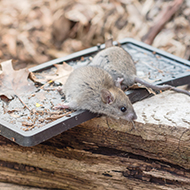Glue traps among worst method of rodent management, study finds

“This work is an important step in understanding the animal welfare impacts of various rat control methods" - Dr Huw Golledge.
Glue traps and anticoagulant poisoning are amongst the worst methods of rodent management when it comes to their impact on rat welfare, according to new research.
The findings, published in Animal Welfare, come ahead of the proposed Glue Traps (Offences) Bill, which could restrict the use of these devices in England if it passes into law. Similar restrictions are being considered in Scotland and Wales.
In the study, researchers assessed the relative welfare impacts of six different rodent control methods and produced a relative welfare impact score for each. The methods included lethal snap trapping; glue trapping, followed by concussive killing; live trapping, followed by concussive killing; two types of rodenticide poisoning; and non-toxic cellulose baiting.
The study concludes that glue trapping and the three baiting methods - anticoagulant poisoning, cholecalciferol poisoning and non-toxic cellulose baiting - all produce high welfare impacts and should therefore be considered as last resorts from a welfare perspective. Comparatively, cage trapping, followed by concussive killing, scored lower welfare impacts.
It also found that the impact of snap trapping was highly variable depending on the traps used. However, high-quality snap traps could help produce the lowest impact - and consequently, the best welfare outcome if used appropriately, the team concludes.
Researchers hope their findings could improve the understanding of pest management professionals and the public and help them to consider animal welfare when selecting control methods.
Dr Sandra Baker from the University of Oxford and lead author of the study, said: “Rat management may represent the greatest source of anthropogenic impact on wild animal welfare. Our findings will help professional pest controllers and members of the public to reduce this impact by better incorporating consideration of animal welfare alongside other factors when choosing a rat control method”.
Dr Huw Golledge, chief executive and scientific director of Universities Federation for Animal Welfare (UFAW), which funded the study, said: “This work is an important step in understanding the animal welfare impacts of various rat control methods. Its strength lies in the level of agreement reached by the diverse range of experts involved. At UFAW, members of the public often ask us for advice about the most humane way to control rat infestations.
"These results give us the information we need to provide advice on which methods are likely to have the least damaging effects on rat welfare. On the back of this research, we have comprehensively updated our webpage resource, which offers advice to the public on how to deal with rodent problems in the most humane way.”



 The latest
The latest